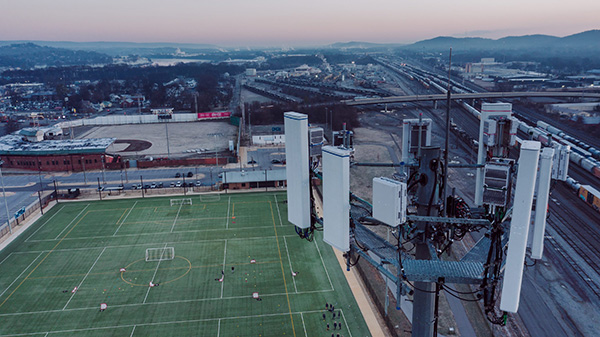Advanced engineering, combined with on-shoring manufacturing, can improve sustainability in the telecoms industry.
Traditionally, when it came to their materials suppliers, telecommunications solutions providers’ concerns were quality and effectiveness, short lead and delivery times, and minimizing their inventory. In 2023, however, it’s vital for manufacturers to include sustainability in their offerings, along with the other criteria. Here, Juha Pesonen, segment owner for telecommunications at composite radome manufacturer Exel Composites, explains how locally manufactured composite materials can deliver more sustainable outcomes for the telecoms sector.

Telecommunications, like most global industries, is trying to reduce its carbon footprint. Telecoms alone generated 3-4% of the 40.8 gigatons of global CO2 equivalent emissions in 2021, with International Telecom Union guidance instructing companies to reach Net Zero greenhouse gas emissions by 2040. There are multiple sides to this challenge: shipping and logistics, manufacturing emissions, performance efficiency, and end-of-life disposal are all important considerations.
One way network providers are minimizing their carbon footprint is by improving the energy efficiency of their installations. Recent wireless infrastructure plans have targeted decommissioning legacy networks and less efficient antennae between 2023 and 2028, cutting electricity usage.
Modern radomes and antenna shrouds built for 5G networks are more efficient, potentially consuming twenty times less energy than 4G equivalents. This is key, as the use of higher frequency ranges will necessitate the construction of additional base stations closer together. If no mitigating action is taken, such as using more energy efficient materials, increased data traffic and base station density is likely to mean 5G networks consume four to five times more energy overall.
Another issue for the telecoms industry is the impact of global supply chains. The concentration of manufacturing in east and south-east Asia over the last 40 years means that international shipping to the Western hemisphere is expensive, slow, and bad for the environment. Since the COVID-19 pandemic, the vulnerability of these long supply lines has also been exposed, with widespread factory closures leading to months of delays overseas. The instability generated by different manufacturers closing, opening, and closing again led to uncertainty and paralysis for those companies needing goods from abroad.
Local manufacturing of mechanical components for telecoms can be more efficient and reliable. One example are closed-shape radomes that give mechanical support to the antenna, reducing the need for other supporting elements and saving on materials like aluminum. However, by shipping these structures from locations far from the installation site, a lot of additional CO2 and costs are added. By shortening the delivery distances, this problem can be mitigated.
To improve their environmental impact, materials providers like Exel Composites are championing local manufacturing. Having factories and other operations in key locations across multiple continents means that network providers can assemble their installations locally and the distance for material transportation is much smaller. The emissions created are therefore also smaller.
After a decades-long downwards trend, the United States has seen an unexpected increase in manufacturing jobs. The industry rebounded quickly after significant government funding protected companies from COVID-19-associated recession. Forgivable loans for small businesses and employee retention tax credits allowed US manufacturers to pay the bills and supply domestic tertiary sector companies through the pandemic.
Exel Composites’ Erlanger factory in Kentucky, USA, is relatively new in its telecoms offering but can support future 5G radome manufacturing and is primed to assist American network providers with local support and quick delivery times. The factory sources its raw materials locally according to the specifications required to comply with each customer’s needs. Additionally, the Erlanger facility operates on a “zero-landfill” basis, with waste materials recycled or re-used in the manufacturing process.
The telecommunications industry’s path to sustainability is complex, but investing in local manufacturing and shortening supply chains is one way to get there. The return of domestic manufacturing in the US has already begun and Exel Composites is proud to be part of the environmental solution for telecoms.
To find out how you can take advantage of Exel Composites’ experience of working with telecoms clients, visit https://exelcomposites.com/composite-solutions/composites-for-telecommunications/.
For further information contact: Exel Composites PLC, Group Management Office, Mäkituvantie 5, FI-01510 Vantaa, Finland
Telephone: +358 20 754 1350
www: https://www.exelcomposites.com/
LinkedIn: https://www.linkedin.com/company/exel-composites/
Press enquiries: Patrick Ball or Greg Coppack – Stone Junction Ltd
Suites 1&2 The Malthouse | Water Street | Stafford | Staffordshire | ST16 2AG
Telephone: +44 (0) 1785 225416
e-mail: patrick@stonejunction.co.uk or greg@stonejunction.co.uk
www: www.wechangeminds.com
Twitter: https://twitter.com/StoneJunctionPR
Facebook: http://www.facebook.com/technicalPR
LinkedIn: https://www.linkedin.com/company/stone-junction-ltd
About Exel Composites
At Exel Composites, we use over 60 years’ experience to solve challenges and help customers save resources. Our forward-thinking composite solutions made with continuous manufacturing technologies serve customers in a wide range of industries around the world. You can find our products used in applications from wind power and transportation to building and infrastructure.
Our collaborative approach and global footprint set us apart from our competition. We use our expertise to help customers reduce weight, improve performance and energy efficiency and decrease total lifetime costs. We want to be the first choice for sustainable composite solutions globally.
Headquartered in Finland, Exel Composites employs approximately 650 forward-thinking professionals around the world and is listed on Nasdaq Helsinki. To find out more about our offering and company please visit exelcomposites.com.
Scott Ellyson, CEO of East West Manufacturing, brings decades of global manufacturing and supply chain leadership to the conversation. In this episode, he shares practical insights on scaling operations, navigating complexity, and building resilient manufacturing networks in an increasingly connected world.